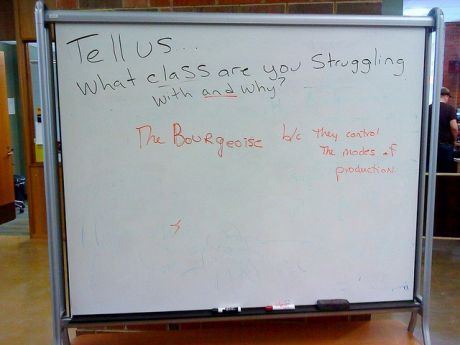Features
You are here
Their classes and ours

June 27, 2013
On April 3, to much fanfare, the BBC published the results of the largest class survey undertaken of British society.
According to the researchers, this study was undertaken because, “over the past decade, there has been a striking renewal of interest in the analysis of social class inequality, driven by accumulating evidence of escalating social inequalities, notably with respect to wealth and income, but also around numerous social and cultural indicators, such as mortality rates, educational attainment, housing conditions and forms of leisure participation.” The current sociological model, the Erikson Goldthorpe–Portocarero model, was seen as inadequate for understanding this new level of social stratification.
Their new model theorizes “elites in a way which has not been possible over recent decades no elite class was distinguished within the EGP.” On the back of their study, the researches therefore proposed a new seven-class model for sociologists in Britain composed of: the elite, the established middle class, the technical middle class, the new affluent workers, the traditional working class, the emergent service workers and the precariat.
The proposed model uses three independent metrics: economic, cultural and social capital. Economic capital is purely a measure of “household income, household savings and house price;” social capital consists of the “contacts and connections which allow people to draw on their social networks;” and cultural capital is divided into high brow and emerging cultural capital, which measure “the extent of respondents’ engagement with classical music, attending stately homes, museums, art galleries, jazz, theater and French restaurants” and “the extent of a respondent’s engagement with video games, social network sites, the internet, playing sport, watching sport, spending time with friends, going to the gym,
going to gigs and preferences for rap and rock.”
It's 2013 and these measures of cultural capital seem almost too ridiculous to bear comment, but their un-ironic silliness tells us something about how mainstream sociology thinks of class.
Where you belong within the seven classes is determined simply by what “stock” you have in these three measures, and not on how you acquire that stock in the first place; they tell you nothing about how you relate to the other classes. Class, in this view, is just an eclectic collection of characteristics.
Marxism
The Marxist understanding of class, by contrast, is dialectical. It is based on a system composed of two dominant classes - workers and capitalists - with these two classes determined by how they relate to each other. The capitalist is a capitalist because they own the means on production and uses this to hire workers. The worker is a worker because they do not own the means of production and so must sell their ability to labour in order to live.
This essential interconnection is what allows Marxists to speak of a necessary antagonism between the classes which is expressed actively as the "class struggle." It is a living, ever-moving relationship, typically taking the form of a protracted war of position fought on multiple fronts with each class fighting to gain strategic advantage. The current form of social stratification is only a snapshot of that war – a snapshot that tells us just how successful the capitalist class has been in the age of neoliberalism.
The difference of approach also reveals something about the nature of mainstream sociology itself. This is a sociology that comes after the fact to catalog the changes and pretends that its catalogs amount to understanding. These new strata themselves emerged while the sociologists weren't really looking, and the unassuming task of sociology is merely to reorganize the theory. What they certainly do not do is explain how these strata emerged in the first place. But stratification is the aggregate result of competing class interests. If inequality has increased in Britain (or Canada), it is because the actions and reactions of people have caused it to increase.
The proposed class categories do not include in their definition the interests and social powers which the people who populate them actually possess. They do not tell us how people – as members of these particular classes – produce and reproduce the increased stratification which occasioned the new model in the first place. In this model, the social reproduction of all the other classes is not the total system from which (for example) the "elites" derive their relative wealth; instead, each class merely reproduces itself.
The superiority of Marxist categories (and therefore our approach to making categories) derives from our constant need to test what we can do with them. Mainstream sociology approaches society after the development has happened; Marxists seek to grasp that development in its movement. The difference between the two is the difference between a sociology that only seeks to anatomize stratification and one that seeks to abolish it. It is the difference between a sociology which pretends to stand neutral and apart from social conflict and one which seeks the best point from which to intervene in it.
If you want to understand the world and to change it, the better approach should be obvious.
Section:
Topics:









